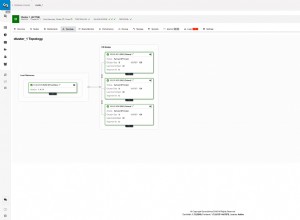Puede usar CROSS JOIN para lograr esto.
CREATE TABLE table1 (id int, column1 varchar(5), column2 varchar(15));
CREATE TABLE table2 (column3 varchar(5), column4 varchar(15));
CREATE TABLE table3 (id int, column5 varchar(5), column6 varchar(15));
INSERT INTO table1 VALUES (1, 'aaa', 'row1')
INSERT INTO table2 VALUES ('bbb', 'table2')
INSERT INTO table3 VALUES (1, 'ccc', 'table3')
INSERT INTO table1 VALUES (1, 'ddd', 'table1')
SELECT * FROM (SELECT * FROM table1) a
CROSS JOIN (SELECT * FROM table2) b
CROSS JOIN (SELECT * FROM table3) c
Resultado:
id column1 column2 column3 column4 id column5 column6
1 aaa row1 bbb table2 1 ccc table3
1 ddd table1 bbb table2 1 ccc table3
Actualización después de la aclaración:
CREATE TABLE table1
(
id int IDENTITY(1,1)
, searchstring nvarchar(25)
);
CREATE TABLE table2
(
id2 int IDENTITY(10, 10)
, searchstring2 nvarchar(25)
, newsearchstring nvarchar(50)
);
CREATE TABLE table3
(
id3 int IDENTITY(100, 100)
, id2 int
, table3srow nvarchar(25)
)
INSERT INTO table1 VALUES ('something');
INSERT INTO table1 VALUES ('something else');
INSERT INTO table1 VALUES ('something'); -- ID = 3, this row will be selected by 1st query
INSERT INTO table2 VALUES ('something', 'newvalue1');
INSERT INTO table2 VALUES ('something else', 'this will not be shown');
INSERT INTO table2 VALUES ('something', 'this will be returned by query 2'); -- ID = 30, this row will be selected by 2nd query
INSERT INTO table3 VALUES (10, 'not relevant');
INSERT INTO table3 VALUES (20, 'not relevant');
INSERT INTO table3 VALUES (30, 'This is from table 3'); -- This row will be returned by 3rd query
SELECT * FROM
(SELECT TOP 1 id, searchstring FROM table1 WHERE searchstring = 'something' and id = (SELECT MAX(id) FROM table1 WHERE searchstring = 'something')) AS query1,
(SELECT TOP 1 id2, newsearchstring FROM table2 WHERE searchstring2 = 'something' and id2 = (SELECT MAX(id2) FROM table2 WHERE searchstring2 = 'something')) AS query2,
(SELECT id2, table3srow FROM table3) as query3
WHERE query3.id2 = query2.id2
Utilice el mismo enfoque para la tabla 4 que se indica para la tabla 3.




